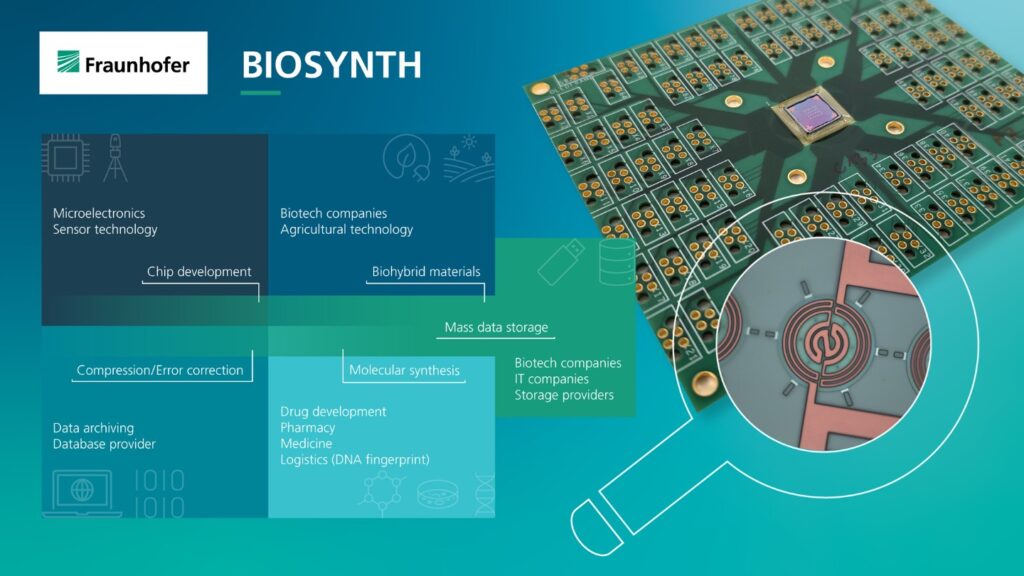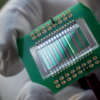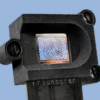
BIOSYNTH – “Modular high-throughput micro-platform for mass data storage of the future from synthetic biology”
The BIOSYNTH project is funded by the Fraunhofer Society and aims to develop a new microchip platform that enables efficient and digitally controllable cell-free biosynthesis. The Fraunhofer Institute for Photonic Microsystems IPMS leads the consortium and collaborates with the Institute for Toxicology and Experimental Medicine ITEM and the Institute for Cell Therapy and Immunology, part of Bioanalytics and Bioprocesses IZI-BB, on technologies that can be used in the future for mass data storage with very high storage density or in pollutant screening in human toxicology.
What is synthetic biology?
Synthetic biology is a field of research that aims to design, replicate, or modify biological systems in the laboratory. This is done by developing standardized components that can be precisely assembled into new units. Synthetic DNA can be used to store and compress binary data, and while writing DNA on microchips remains a significant challenge, it also presents a substantial opportunity. Information can be stored at high density on microchips by specifically arranging base pairs in a digitally controllable three-dimensional manner. Additionally, the consortium is exploring other applications of synthetic biology, such as detecting pathogens in wastewater – including sensory approaches. Such topics are to be discussed at a user workshop during the SynBioReactor Summit of the German Society for Synthetic Biology on August 21st, in Berlin-Adlershof.
What does BIOSYNTH contribute to process improvement?
The BIOSYNTH project aims to enhance the current performance of microbiological synthesis by pooling the expertise of three Fraunhofer Institutes. Using modern microsystem technology, a universal microchip platform is being researched that can be used for writing DNA, RNA, and peptides. Previous synthesis methods, such as "spotting," are inefficient, especially in generating long DNA segments, and tend to be inaccurate, with corrections being both time-consuming and costly. Moreover, the existing equipment is large and associated with high costs.
"The BIOSYNTH project thus intends to explore the microsystem technical and biological foundations for advanced microbiological high-throughput synthesis in highly integrated microchips with thermal, photonic, and fluidic components, addressing both biological mass data storage of extremely high storage density and aging resistance, as well as applications in biology, biochemistry, or applied ecology," explains Dr. Uwe Vogel, consortium leader from Fraunhofer IPMS.
The researchers are developing a platform based on conventional microchip fabrication techniques to write software-defined nucleotide sequences (DNA, RNA, or peptides). This platform enables the implementation of biological mass data storage for highly parallel and high-throughput processes, like the volume production processes of the microelectronics industry. Designed and manufactured using microelectronics methods, the platform integrates miniaturized reaction cells at the micrometer level, which have reaction volumes in the picolitre range, for cell-free synthesis in a freely programmable active-matrix array. Special thermal and photonic components, as well as the functionalization of the surfaces of each reaction cell, enable the transport, immobilization, activation, and monitoring of process conditions and results.
The Fraunhofer IPMS is developing the integrated circuit of the CMOS backplane, which is used to control and read out the microheaters for biosynthesis. This circuit is also used for the OLED and photodetector pixels in the active-matrix arrangement, as well as for a corresponding test setup. Additionally, the institute is responsible for developing the "thermal" level of the microchip platform, which enables temperature control for biological synthesis through micromechanical surface structures, like the technology of capacitive micromachined ultrasonic transducers (CMUT). The institute also contributes its expertise in simulating thermal functionality. Another task in the project is the implementation of MEMS technology that allows the integration of organic components such as light-emitting and photodiodes to monitor the synthesis process. Subsequently, researchers from the Fraunhofer IZI-BB in Potsdam will conduct the synthesis process using the microchip platform.
What applications are there?
In addition to mass data storage, there are other applications for synthetic biology (see also Figure 1). For example, Fraunhofer ITEM is working on coding methods in biological components. These include error-correcting codes and compression methods. This allows even images with low pixel heterogeneity to be encoded in DNA by breaking the repeating bases with a random mask and storing the data in plasmids. The storage of images in DNA and the possibility of error-free retrieval are being experimentally investigated, and a coding scheme has been developed that enables compression and avoids image shifts caused by errors.
Prof. Christoph Schäfers, Director of the Fraunhofer Institute for Molecular Biology and Applied Ecology IME, explains another application area of synthetic biology: "The screening of human toxicology using synthetic biology employs artificially created biological systems to test the effects of substances on the human body. This method allows potentially harmful effects to be detected and analyzed at an early stage."
How are the project's results put into practice?
The project is supported by a group of renowned advisors from industry, academia, and practice, including experts from the University of Marburg, XFAB, Infineon, the Federal Archives, and Hybrotec. The interim results of the project will be presented to the public in a workshop for users on August 21, 2024, during the SynBioReactor Summit in Berlin. Prof. Schäfers will also be available for discussions on human toxicology screening during the workshop. Additionally, workshop participants will have the opportunity to contribute and discuss individual application ideas in themed islands.
Find the original press release here.
Document Details and Download
- BIOSYNTH
- Biosynthesis
- Fraunhofer IPMS
- Fraunhofer Society
- Mass Data Storage
- Microchip Platform
- synthetic biology
XFAB;
Infineon;
Hybrotec






BIOSYNTH – “Modular high-throughput micro-platform for mass data storage of the future from synthetic biology” 0 reviews
Login to Write Your ReviewThere are no reviews yet.